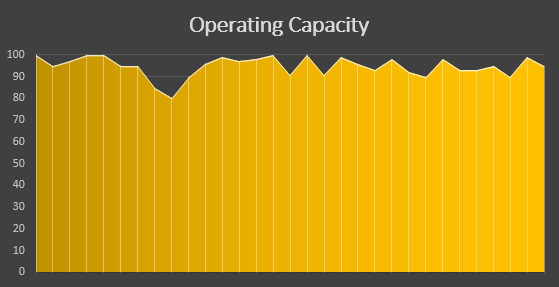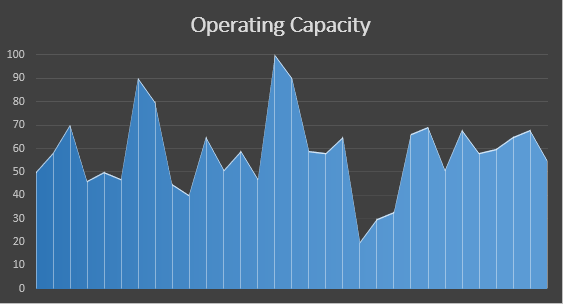Personal Duty Cycle
What happens if you pick up a water glass filled to the brim and run around with it? You spill it, or you walk so slowly with such care that you never get anywhere and the only thing you can do is focus on the brim to make sure it stays steady. (Or you engineer something complex to prevent the spilling or perhaps you freeze it.) Or perhaps you stop, reflect, and ask why am I trying to transport a glass that is 100% full?
This glass is your operational capacity.
Photo credit: Lacey Mason
I offer you the metaphor of this glass representing your operating capacity and challenge you to ask yourself the same question.
In world where our culture and workplaces tell us that we need to give 100% or maybe even 110%, how are you going to fill that glass to the brim and keep it there? And then on occasion, add 10%? I have two words for you - duty cycle. As engineers, when designing a system, process, or product, there are operating parameters and inputs to develop a robust design to meet the anticipated operating and environmental demands. Things, processes, and people are not designed to operate at 100% (certainly not 110%) all the time. Operating our lives at this level is not the formula for an impactful, fulfilling life.
What does your duty cycle look like?
Where have you been operating and for how long?
How much longer do you think you can "keep it up"?
Elite athletes that have incredible stamina and strength require rest and don't work at their full limit for long periods of time. In reality, operating at 60-70% capacity is ideal allowing you have surge capacity to rise to the occasion when necessary. This allows you to capacity to be there for yourself and others in a present and intentional way carrying your reasonably filled glass of water, rather than walking alongside them with your eyes glued and your focus on the glass being careful to not spill anything.
Less > more.
I once shared this concept with a good friend. She took it to heart and saw operating at 100% did not serve her, diminishing the joy from the things she was doing, and that she wasn't doing all those things well. At 70% she felt more at peace and energized to really give to what was in front of her. When an untimely passing of a lifelong friend happened, she reached out to thank me for these words of wisdom because she had the capacity to be there for her friend’s family and to process her own grief.
Life is cyclical, when you are on vacation, you allow yourself to operate at a lower capacity, when you have a tight deadline, you rise to the occasion. The key part is giving yourself permission and allowing rest. Sure, it is easier to do when you are on vacation. However, you owe it to yourself to operate at a sustainable level more often.
There are many ways to scale back - delegating, being more selective on projects, re-evaluating a current endeavor that is not serving you or is no longer profitable, planning personal recharge time each day, hiring something out, etc. Maybe you're great at supporting your team when they want to take time off and not supporting yourself in the same way. The operating capacity level you choose for yourself sets the stage for your team.
Are you looking to re-level your or your teams nominal operating capacity? Bring it up at staff meetings or in one-on-ones. Doing this once or twice is insufficient to make a lasting culture shift, it needs to be an ongoing part of your message and values to take root. This is not because your message is unclear, it is because it takes time for others to make the change in their own minds.
Giving yourself permission to change or allow yourself to rest is a higher hurdle than allowing someone else to relax. Case and point, how many times have you been sick, not felt well, and still gone to work because of the voice in your head spinning stories about staying home being lazy or you fear work compounding in your absence and you'd rather be miserable at work? Be honest with yourself, how effective are you going to be when you are sick? It is only when you get to work and your colleagues take one look at you and tell you to go home, you give yourself permission to take the day off.
Final point, your self-worth and potential are not tied to level at which you operate. Self-care and rest is not lazy, self-indulgent, or selfish - it's essential. You are as amazing at 60% as you are at 100%, perhaps even more because you have bandwidth and have capacity to respond rather than react when important decisions arise.




